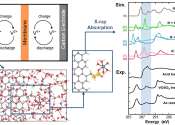Perfect imperfection: Electrode defects boost resistive memory efficiency
Resistive switching memory devices offer several advantages over the currently used computer memory technology. Researchers from the MIPT Atomic Layer Deposition Lab have joined forces with colleagues from Korea to study ...
Nov 23, 2020
0
4









